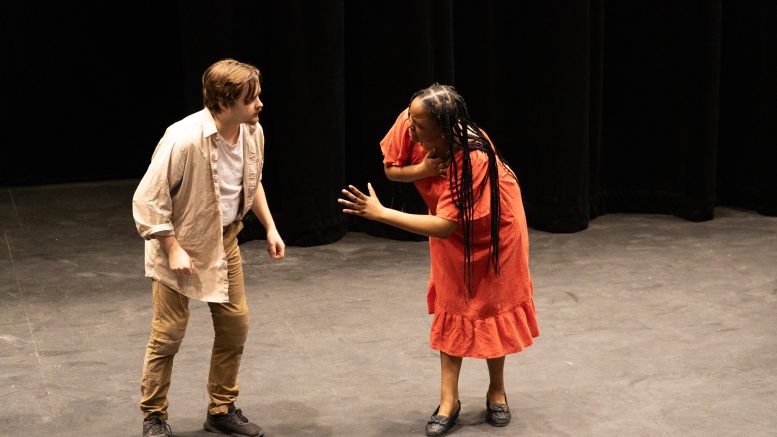A bustling scene unfolds in the green room of the John J. Conklin Theatre as students return to rehearsals for the third student-led show of the year, colloquially known as a LunchBHAGG: For Elise by Brazilian playwright Grace Passô, translated by Daniel Hahn, and directed by Catarina Mello Schultz. The show will open its doors to audiences Feb. 6 and 7.
The play follows five characters’ intertwining lives as they live, work and interact all within the same neighbourhood.
A housewife, played by Emang Tlale, tells the audience the tales of her neighbours — a woman and a garbage man, played by Martina Caceres and Rodrigo Córdova, chase each other across the stage. An official known by no other title, played by Kirstin Caguioa, searches for a sick dog while a man, played by Zane Lindberg, begins barking.
Each character has their own fully realized story and is given a moment to shine, interacting with one another or appearing onstage alone. The show is playful, energetic and filled with childlike wonder. It portrays a bizarre and vibrant tapestry of life, even though we are only able to witness brief moments.
In only 45 minutes, these characters come together in a story about the cruciality of human connection. Characters move through the feelings their relationships provoke, experiencing fear or love as the story blurs the lines between the emotional and rational, the human and the animal.
“I think the biggest idea of the story is to show how people connect,” Mello Schultz said.
“We are all going on with our lives but we will connect to other people, and some people might try not to get involved with anyone else, with anything, maybe to spare themselves. But it’s hard not to.”
When Schultz applied to direct one of the U of M theatre program’s student-led shows, her main priority was to find a Brazilian-written show.
The search was fuelled by a desire to see a story that she could not only connect with more, but enhanced that connection in regard to her own culture and language. So when given the opportunity to direct a show herself, she chose to introduce her classmates to “something closer to home.”
During her process of directing the play, Mello Schultz found herself inspired by the other theatre classes she is taking. Her inspirations come from discussions on books like I Hope We Choose Love by Kai Cheng Thom, or the Seven Teachings she learned in her Canadian Indigenous theatre course taught by Ian Ross.
Mello Shultz spoke fondly of her professors and classmates in the program, emphasising that “it wouldn’t be theatre without community.”
The theme of community relates heavily to For Elise. The learning process and student theatre were vital for Mello Schultz embracing the actors’ human moments to heighten the performance.
Mello Shultz’s choice of play and Passô’s clever writing emphasize the importance of reading more stories, trying new things and opening ourselves up to connection.
For Elise will be playing at the John J. Conklin Theatre, Gail Asper Performing Arts Hall on the third floor of Taché Arts Centre on Feb. 6 at 12 p.m. and 7:30 p.m. and Feb. 7 at 7:30 p.m. Admission is free.





